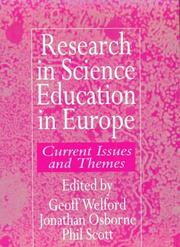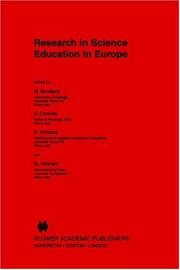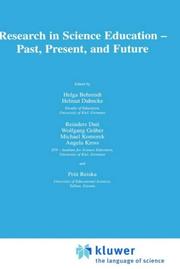| Listing 1 - 4 of 4 |
Sort by
|

ISBN: 0750705477 9780750705479 Year: 1996 Publisher: London : Falmer press,
Abstract | Keywords | Export | Availability | Bookmark
 Loading...
Loading...Choose an application
- Reference Manager
- EndNote
- RefWorks (Direct export to RefWorks)
Science --- Study and teaching --- Research --- Congresses. --- Congresses --- Science - Study and teaching - Research - Europe - Congresses
Book
ISBN: 9026502664 9789026502668 Year: 1977 Publisher: Amsterdan ; Lisse : Swets & Zeitlinger,
Abstract | Keywords | Export | Availability | Bookmark
 Loading...
Loading...Choose an application
- Reference Manager
- EndNote
- RefWorks (Direct export to RefWorks)
Didactics of sciences --- Higher education --- Europe --- Science --- Education --- Study and teaching --- Research --- International cooperation --- -Science --- -Natural science --- Science of science --- Sciences --- Children --- Education, Primitive --- Education of children --- Human resource development --- Instruction --- Pedagogy --- Schooling --- Students --- Youth --- Civilization --- Learning and scholarship --- Mental discipline --- Schools --- Teaching --- Training --- -Study and teaching --- -International cooperation --- -Research --- -Education --- Natural science --- Study and teaching&delete& --- Natural sciences --- Science - Study and teaching - Research - Europe --- Science - Study and teaching - International cooperation --- Education - Research - Europe

ISBN: 0792356993 9048152186 9401593078 9780792356998 Year: 1999 Publisher: Dordrecht : Kluwer academic,
Abstract | Keywords | Export | Availability | Bookmark
 Loading...
Loading...Choose an application
- Reference Manager
- EndNote
- RefWorks (Direct export to RefWorks)
This volume presents a "photograph" of the state of the art in Science Education Research in Europe as it has emerged from the first ESERA Conference held in Rome in September 1997. The Conference saw the participation of more than 280 researchers from European and some extra European countries distributed as follows U. K. 46 The Netherlands 10 Germany 35 Finland 9 Italy 28 Switzerland 6 Spain 26 Portugal 6 France 18 Israel 5 Sweden Argentina 15 3 Denmark 14 Australia 3 Greece 14 USA 3 Brasil 11 Others 18 Norway TOTAL 11 281 As it can be seen from the table, although the group from U. K. where research in science education has a well established tradition is the most consistent one, quite a large number of researchers has come from Germany and the Scandinavian countries, sign of the increasing attention these countries pay to scientific education at all levels. The presence of researchers from extraeuropean countries has allowed a comparison of experience over a wider basisthan the national one. The themes of research, identified a priori by the organizers as important, were: of the Art in Science Education Research (Biology, - The State Chemistry, Physics and Earth Science) - Science Teaching and Learning - Science, Science Teaching and Society - Teachers' Education and its Cultural Components The Scientific Committee of the Conference decided to publish a selection of the papers presented and we accepted the task of the editing.
Science --- Study and teaching --- Research --- Science education. --- Teaching. --- Learning. --- Instruction. --- Chemistry. --- Educational technology. --- Science Education. --- Teaching and Teacher Education. --- Learning & Instruction. --- Chemistry/Food Science, general. --- Educational Technology. --- Instructional technology --- Technology in education --- Technology --- Educational innovations --- Instructional systems --- Teaching --- Physical sciences --- Learning process --- Comprehension --- Education --- Didactics --- Instruction --- Pedagogy --- School teaching --- Schoolteaching --- Pedagogical content knowledge --- Training --- Science education --- Scientific education --- Aids and devices --- Science - Study and teaching - Research - Europe.

ISBN: 1280201231 9786610201235 0306476398 9780792367550 0792367553 9780306476396 Year: 2001 Publisher: Dordrecht, Netherlands ; Boston, Massachusetts : Kluwer Academic Publishers,
Abstract | Keywords | Export | Availability | Bookmark
 Loading...
Loading...Choose an application
- Reference Manager
- EndNote
- RefWorks (Direct export to RefWorks)
This volume includes articles based on papers presented at the Second International Conference of the European Science Education Research Association (E.S.E.R.A.) held in Kiel, August 31 to September 4, 1999. About 300 colleagues, virtually from around the world - with a particular European focus - participated. Some 200 papers were presented. Three pages synopses of these papers were published in Proceedings of the conference (edited by Michael Komorek, Helga Behrendt, Helmut Dahncke, Reinders Duit, Wolfgang Gräber and Angela Kross). They are available from the IPN homepage: http://www.ipn.uni-kiel.de. The participants were asked to submit contributions to the present volume. It contains the invited plenary lectures and a selection of the submitted contributions based on reviews by an international board and the editors. The volume mirrors main lines of research in science education in Europe and around the world. The invited lectures provide overviews of the growth of science education research from the past to the present, including views of future developments. Major emphasis of empirical research still seems to be students' conceptions and conceptual change. About half of the contributions fall into that category. In addition, most of the remaining contributions deal with various cognitive issues of teaching and learning science. It was surprising for us that the number of studies on affective issues and gender differences was much smaller than expected.
Science --- Study and teaching --- Research --- Science - Study and teaching - Research - Europe -. --- Science_xStudy and teaching. --- Education. --- Science. --- Chemistry. --- Educational technology. --- Science education. --- Teaching. --- Learning & Instruction. --- Science, general. --- Science Education. --- Teaching and Teacher Education. --- Educational Technology. --- Chemistry/Food Science, general. --- Science, Humanities and Social Sciences, multidisciplinary. --- Study and teaching. --- Learning. --- Instruction. --- Physical sciences --- Instructional technology --- Technology in education --- Technology --- Educational innovations --- Instructional systems --- Teaching --- Didactics --- Instruction --- Pedagogy --- School teaching --- Schoolteaching --- Education --- Pedagogical content knowledge --- Training --- Science education --- Scientific education --- Learning process --- Comprehension --- Aids and devices --- Natural science --- Natural sciences --- Science of science --- Sciences
| Listing 1 - 4 of 4 |
Sort by
|

 Search
Search Feedback
Feedback About UniCat
About UniCat  Help
Help News
News